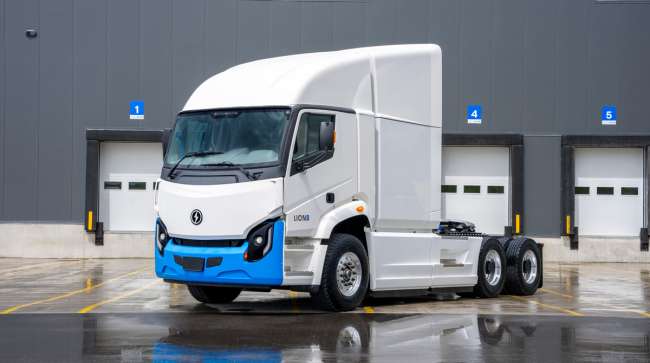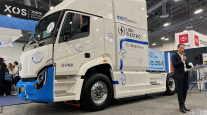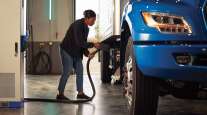Staff Reporter
Bus, Truck Maker Lion Electric Sells Facility to Raise Funds

[Stay on top of transportation news: Get TTNews in your inbox.]
Lion Electric is selling its innovation center in Mirabel, Quebec, to Aeroport de Montreal for C$50 million ($35.3 million) as the embattled battery-electric truck and bus maker fights to stay afloat.
Days after laying off 400 staff and halting production at its Joliet, Ill., bus manufacturing plant, Lion continued its ongoing fundraising push with the sale of the 17,925-meter square building, which sits next to the company’s 175,000-square-foot gigafactory battery production plant. The deal is set to close before the end of December.
Lion said Dec. 5 the funds from the sale of the facility would be used for partial repayment of senior secured non-convertible debentures issued in July 2023, reducing its long-term debts.
The debentures were issued to a group of investors led by Canadian real estate developer and manager Mach Groupe and the Mirella & Lino Saputo Foundation.
However, the company said its tricky short-term liquidity and cash position were unaffected. On Dec. 1, Lion obtained temporary relief by extending the repayment deadline on a loan and amending the terms of a revolving credit facility.
Lori Heino-Royer of Waabi discusses the latest developments, breakthroughs and key industry partnerships in autonomous trucking. Tune in above or by going to RoadSigns.ttnews.com.
The maturity date for the loan from Finalta Capital and Caisse de dépôt et placement du Quebec was extended to Dec. 16 from Nov. 30. Suspension of financial covenants under the credit facility with a group of banks including National Bank of Canada and Bank of Montreal were also extended to Dec. 16.
Even with the forbearance of the banks, Lion warned its finances remained especially dire, with a sale of the business or certain assets not out of the question.
To cut its costs in the interim, Lion laid off 400 staff in Canada and the U.S. while also suspending production in Joliet.
These are not the first job cuts at the Montreal-based company, which like many fellow trucking startups is chewing through cash reserves, cutting costs and in search of additional backing.
Just over 12 months earlier, Lion Electric laid off 150 employees, or 10% of its workforce. At the time, Lion said the job cuts would speed its path to profitability.
In April, Lion parted with 120 employees, mostly in Canada and focused on overhead and product development, while in February, around 100 staff departed, with most of the employees part of the night shift at its Saint-Jerome manufacturing facility.
Following the latest layoffs, Lion said it would have around 300 employees “who will focus on the company’s bus manufacturing, sales and delivery operations.”
Nothing was said about its battery-electric truck production, and a spokesman did not respond to multiple requests for comment.
At the Advanced Clean Transportation Expo in May, Lion unveiled the Lion8 Tractor, a Class 8 semi featuring a 6x4 axle configuration with two integrated 2-speed e-axles. The tractor offers a range of up to 275 miles on a single charge, Lion said, adding that its batteries can be charged to 80% in about 90 minutes with a direct current fast charger.
(Lion Electric via YouTube)
Lion8 joined a lineup comprising two battery-electric school buses — the LionC and LionD — and its Lion5 and Lion6 medium-duty trucks. Production of LionD buses in the U.S. began in the third quarter of 2023 after the Joliet plant opened in July 2023.
Lion5 was launched at the 2023 edition of ACT Expo. The truck was the first to use proprietary LionBattery packs.
Lion was previously a customer of Romeo Power, which U.S.-based Class 8 truck maker Nikola liquidated in July after problems with its batteries. Classes 4-6 truck manufacturer Mullen Automotive on Sept. 11 bought Romeo’s battery production assets for $3.5 million.
Bus and truck sales at Lion slumped in the most recent quarter. Lion sold 89 vehicles in Q3, compared with 245 in Q3 2023, citing the impact of the timing of U.S. Environmental Protection Agency clean bus program awards and delays in customers’ subsidies under the Canadian federal government’s Zero Emission Transit Fund program. Lion received $38 million in January from the EPA program.
Want more news? Listen to today's daily briefing above or go here for more info
Lion had $26.29 million in cash on hand at the end of the most recent quarter along with more than $215 million in inventory, according to Q3 results released Nov. 6. The company’s production costs in Q3 totaled $46.6 million, while administrative expenses totaled $9.7 million and sales expenses $3.8 million.
As a result, an ever more pressing hunt for additional funding continues. Media reports suggest Lion is in talks with Mach Capital, the investment arm of Groupe Mach, plus the government of Quebec. Mach Capital declined to comment. Quebec’s economics ministry was not immediately available for comment.
Lion previously received a C$5 million loan from Investissement Quebec in July. Investissement Quebec is a province-owned development fund. Quebec provided C$50 million to build the innovation center and battery production plant in Mirabel in 2021.





